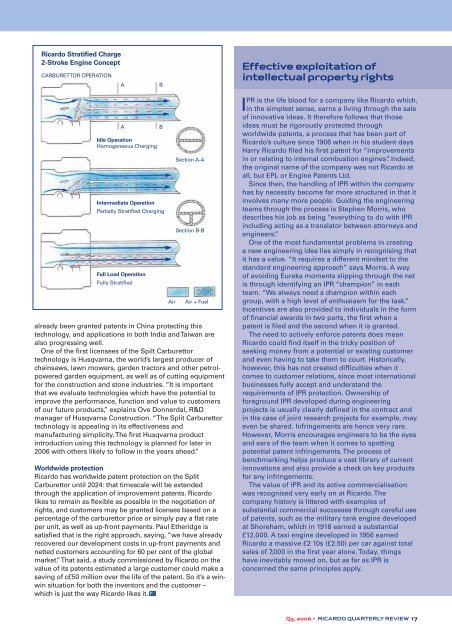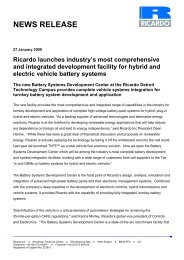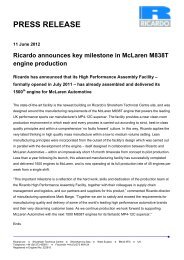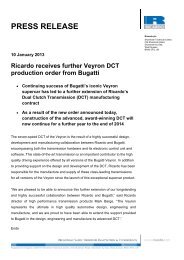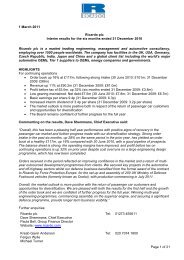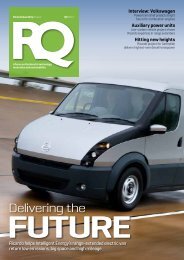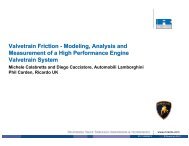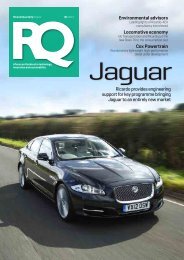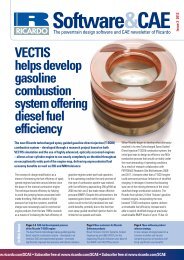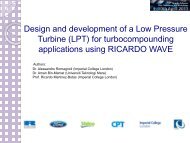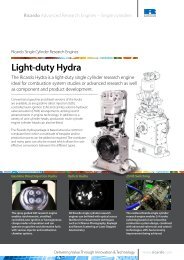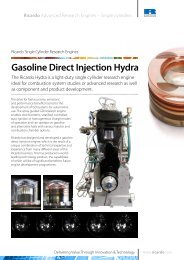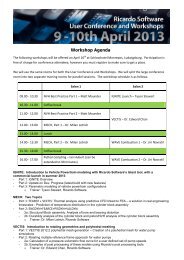The hottest - Ricardo
The hottest - Ricardo
The hottest - Ricardo
Create successful ePaper yourself
Turn your PDF publications into a flip-book with our unique Google optimized e-Paper software.
<strong>Ricardo</strong> Stratified Charge<br />
2-Stroke Engine Concept<br />
CARBURETTOR OPERATION<br />
A<br />
A<br />
Idle Operation<br />
Homogeneous Charging<br />
already been granted patents in China protecting this<br />
technology, and applications in both India and Taiwan are<br />
also progressing well.<br />
One of the first licensees of the Spilt Carburettor<br />
technology is Husqvarna, the world’s largest producer of<br />
chainsaws, lawn mowers, garden tractors and other petrolpowered<br />
garden equipment, as well as of cutting equipment<br />
for the construction and stone industries. “It is important<br />
that we evaluate technologies which have the potential to<br />
improve the performance, function and value to customers<br />
of our future products,” explains Ove Donnerdal, R&D<br />
manager of Husqvarna Construction. “<strong>The</strong> Split Carburettor<br />
technology is appealing in its effectiveness and<br />
manufacturing simplicity. <strong>The</strong> first Husqvarna product<br />
introduction using this technology is planned for later in<br />
2006 with others likely to follow in the years ahead.”<br />
Worldwide protection<br />
<strong>Ricardo</strong> has worldwide patent protection on the Split<br />
Carburettor until 2024: that timescale will be extended<br />
through the application of improvement patents. <strong>Ricardo</strong><br />
likes to remain as flexible as possible in the negotiation of<br />
rights, and customers may be granted licenses based on a<br />
percentage of the carburettor price or simply pay a flat rate<br />
per unit, as well as up-front payments. Paul Etheridge is<br />
satisfied that is the right approach, saying, “we have already<br />
recovered our development costs in up-front payments and<br />
netted customers accounting for 60 per cent of the global<br />
market.” That said, a study commissioned by <strong>Ricardo</strong> on the<br />
value of its patents estimated a large customer could make a<br />
saving of c£50 million over the life of the patent. So it’s a winwin<br />
situation for both the inventors and the customer –<br />
which is just the way <strong>Ricardo</strong> likes it.<br />
B<br />
B<br />
Intermediate Operation<br />
Partially Stratified Charging<br />
Full Load Operation<br />
Fully Stratified<br />
Air<br />
Section A-A<br />
Section B-B<br />
Air + Fuel<br />
Effective exploitation of<br />
intellectual property rights<br />
IPR is the life blood for a company like <strong>Ricardo</strong> which,<br />
in the simplest sense, earns a living through the sale<br />
of innovative ideas. It therefore follows that those<br />
ideas must be rigorously protected through<br />
worldwide patents, a process that has been part of<br />
<strong>Ricardo</strong>’s culture since 1906 when in his student days<br />
Harry <strong>Ricardo</strong> filed his first patent for “improvements<br />
in or relating to internal combustion engines”. Indeed,<br />
the original name of the company was not <strong>Ricardo</strong> at<br />
all, but EPL or Engine Patents Ltd.<br />
Since then, the handling of IPR within the company<br />
has by necessity become far more structured in that it<br />
involves many more people. Guiding the engineering<br />
teams through the process is Stephen Morris, who<br />
describes his job as being “everything to do with IPR<br />
including acting as a translator between attorneys and<br />
engineers.”<br />
One of the most fundamental problems in creating<br />
a new engineering idea lies simply in recognising that<br />
it has a value. “It requires a different mindset to the<br />
standard engineering approach” says Morris. A way<br />
of avoiding Eureka moments slipping through the net<br />
is through identifying an IPR “champion” in each<br />
team. “We always need a champion within each<br />
group, with a high level of enthusiasm for the task.”<br />
Incentives are also provided to individuals in the form<br />
of financial awards in two parts, the first when a<br />
patent is filed and the second when it is granted.<br />
<strong>The</strong> need to actively enforce patents does mean<br />
<strong>Ricardo</strong> could find itself in the tricky position of<br />
seeking money from a potential or existing customer<br />
and even having to take them to court. Historically,<br />
however, this has not created difficulties when it<br />
comes to customer relations, since most international<br />
businesses fully accept and understand the<br />
requirements of IPR protection. Ownership of<br />
foreground IPR developed during engineering<br />
projects is usually clearly defined in the contract and<br />
in the case of joint research projects for example, may<br />
even be shared. Infringements are hence very rare.<br />
However, Morris encourages engineers to be the eyes<br />
and ears of the team when it comes to spotting<br />
potential patent infringements. <strong>The</strong> process of<br />
benchmarking helps produce a vast library of current<br />
innovations and also provide a check on key products<br />
for any infringements.<br />
<strong>The</strong> value of IPR and its active commercialisation<br />
was recognised very early on at <strong>Ricardo</strong>. <strong>The</strong><br />
company history is littered with examples of<br />
substantial commercial successes through careful use<br />
of patents, such as the military tank engine developed<br />
at Shoreham, which in 1918 earned a substantial<br />
£12,000. A taxi engine developed in 1956 earned<br />
<strong>Ricardo</strong> a massive £2 10s (£2.50) per car against total<br />
sales of 7,000 in the first year alone. Today, things<br />
have inevitably moved on, but as far as IPR is<br />
concerned the same principles apply.<br />
Q3, 2006 • RICARDO QUARTERLY REVIEW 17


